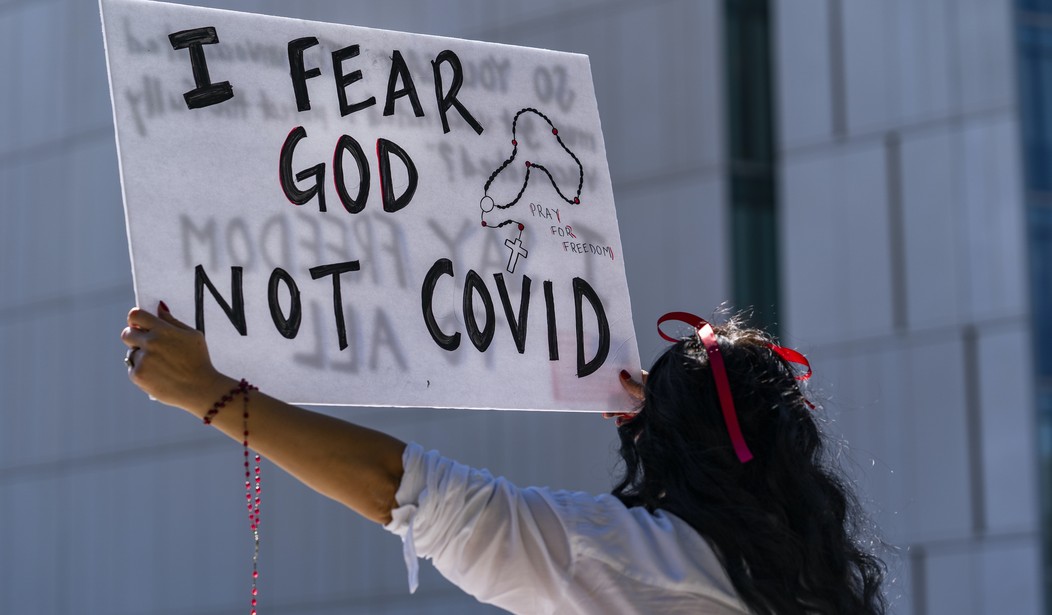I know, I know. What about that Israeli study from August that showed natural immunity is way, way better than vaccine immunity?
What can I tell you. Newsflash: Different studies can produce conflicting results.
In light of this new one from the CDC, maybe we can settle on an uneasy assumption that not every case of natural immunity produces better or longer-lasting protection than vaccination does. Some people infected with COVID may experience mild cases that don’t generate as many antibodies as immunization would. And natural immunity wanes in time just as vaccine immunity does, although how long it takes to fade on average is unknown.
I think the material question isn’t “Is vaccination or natural immunity better?” It’s “Why wouldn’t you also get at least one dose of the vaccine if you’ve already had COVID?” A number of studies have shown that recovering from the disease and then getting a shot produces super-immunity capable of protecting a person against all variants, including ones not found in nature (yet). No one has an immune response as sophisticated as people who’ve been exposed to the virus and then been exposed again to the spike protein via vaccination. So why not take advantage?
Unvaccinated people who had survived a previous COVID-19 infection were more than five times more likely to be reinfected with the virus compared to those who were fully vaccinated with the Pfizer or Moderna vaccines, according to a new study published by the Centers for Disease Control and Prevention.
The finding comes from data published Friday in the CDC’s Morbidity and Mortality Weekly Report, examining records of adults hospitalized with COVID-19 symptoms in the agency’s “VISION Network” of hospitals spanning nine states.
The study’s authors said their findings showed “vaccine-induced immunity was more protective than infection-induced immunity” among patients who had their first bout of the disease or were vaccinated three to six months earlier.
Can we square that somehow with the Israeli study?
Let’s check the fine print. The CDC study looked at people who were either infected or vaccinated within a window of three to six months previously. The Israeli study focused on people who’d been vaccinated more than six months before. So it may be that the Israeli data reflects some degree of waning immunity among the vaccinated over time. If so, it could mean that natural immunity is weaker on average in the near term (three to six months) but stronger on average in the longer term (more than six months).
The subjects in the two studies differ in an important way too. The Israeli study compared two groups, one with natural immunity and one with vaccine immunity, to see who got infected more often. The CDC study compared the same two groups among those who were hospitalized with “COVID-like illness.” Maybe people who’ve recovered from the disease once before and who end up having a weak immune response later for whatever reason are more likely to need hospital care if they’re reinfected than people who’ve been vaccinated for COVID are. In fact, that’s what we’d expect based on prior studies: More than a third of people infected with the virus end up with no measurable antibodies afterward. Virtually everyone who’s vaccinated ends up with antibodies.
The bottom line, though, is that it seems shaky to extrapolate about what sort of protection the average person with vaccine immunity or natural immunity enjoys from a cohort of people who landed in the ER for “COVID-like” reasons. Maybe the average person who’s had COVID and gets reinfected does better than the average vaccinated person who gets a breakthrough infection despite the fact that there’s a subset of the reinfected who struggle. Which would make sense, no? Someone who hasn’t had their shots but has recovered from COVID yet didn’t develop robust antibody protection afterward is basically just an unvaccinated person. And unvaccinated people are more prone to severe illness than the vaccinated when infected.
There’s an age component to the CDC study too. Note the split at the end of this data set from the study:
Striking increase in risk of *Unvaccinated, Prior Covid* across the age groups, vaccines, variants, time of prior infection ranging from 2.5 to 19.5-fold pic.twitter.com/Hh2Khu58Bz
— Eric Topol (@EricTopol) October 29, 2021
For those under 65, hospitalized people with natural immunity in the three-to-six-month window were a little more than twice as likely as hospitalized vaccinated people of the same age to test positive. But among those over 65, they were 19 times more likely. That suggests that natural immunity wanes quickly in senior citizens, possibly because they’re not developing as many antibodies after infection as they are after vaccination. So in case grandma and grandpa didn’t already have enough incentive to get their shots, that’s another one. If they’ve survived the virus once already, they shouldn’t count on natural immunity to ensure that they survive it again.
Regardless of whether vaccine immunity is better than natural immunity or vice versa, there’s little doubt that hybrid immunity is better than both. If you’ve had COVID and aren’t politically opposed to vaccination for whatever reason, get the shot and become one of the immortals.








Join the conversation as a VIP Member